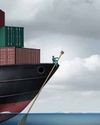Having withered many a storm in the past 140 years, DB Schenker has evolved the mechanism to survive difficult times. As Schenker India celebrates its 20th anniversary, it is ready to tap the the tier II and tier III cities

Q Global trade is dull and Indian exports have been down for the past few months. How are you adjusting your business strategy to survive these difficult times?
The slow growth in Indian exports and the overall dull global trade scenario is certainly a challenge. Over the past 140 years of global transportation and logistics expertise, we have weathered many such storms and hence developed efficient processes and infrastructure to deal with such situations. These highly proficient processes and adherence to their parameters leave little room for wastage and help us keep a tight control over operations and costs. While acquiring new customers is always a priority, retaining existing customers by providing end-to-end solutions and value-added services is crucial. We make long term associations with customers, particularly where they are looking for a solution provider and not a transporter. We are also introducing new products like DB SCHENKER skybridge services, new lanes for LCL services, and many others to spur additional growth.
Q How are the customer dynamics changing and how are you adjusting your service offerings accordingly?
The Indian logistics market is rapidly transforming into a highly competitive market with many players and sophisticated customers. Our focus on efficient processes which save both time and money and an integrated solution-led approach keep customers happy. Value-added services and supply chain integration enable to meet customers’ demand in almost every situation.
Q Among air freight and ocean freight which one has a major contribution to your bottom line? Which of these businesses is growing faster and why?
Bu hikaye Maritime Gateway dergisinin October2016 sayısından alınmıştır.
Start your 7-day Magzter GOLD free trial to access thousands of curated premium stories, and 9,000+ magazines and newspapers.
Already a subscriber ? Giriş Yap
Bu hikaye Maritime Gateway dergisinin October2016 sayısından alınmıştır.
Start your 7-day Magzter GOLD free trial to access thousands of curated premium stories, and 9,000+ magazines and newspapers.
Already a subscriber? Giriş Yap

Impact Of Covid-19 On Shipping And Logistics
Industry stalwarts discuss threadbare the prevailing logistics and supply chain scenario and issues in clearing cargo during the COVID-19 lockdown

Digital Platforms Defy Lockdown
Digital trading modules such as eNAM are enabling farmers to move their produce from farm to market even during the lockdown

GARMENT TRADE TRAMPLED
As retailers face a shutdown in US and Europe, the cascading affect has caused mass cancellation of orders in Bangladesh

TRADE RESUMES WITH CHINA
While India has allowed uninterrupted movement of imports into Nepal even during lockdown, China is reopening its borders as it emerges from the pandemic
LESS HUMAN INTENSIVE, MORE DATA DRIVEN
AI provides transformational opportunity for logistics industry by improving customer experience, operational efficiency, faster turnaround time and lower cost while ensuring security and transparency. Macro environment requires industry to transform to be less human intensive, agile and data driven, all of which can be accelerated by AI adoption, shares Gangadhar Gude, Founder & CEO, atai.ai

SHAKEN AND STIRRED
The COVID-19 pandemic has partially paralysed the logistics and supply chain, but the industry is still deterred to ensure supply of essentials continues

TRADE STUCK, ECONOMY SLOWS DOWN
Sri Lankan economy slows down as trade deficit widens and supply chain disrupts amidst lockdown

LENDING INTELLIGENCE TO SUPPLY CHAIN
If you’re shipping millions of dollars’ worth of pharmaceuticals, high-end electronics, expensive seafood, or precious metals, what would you be willing to pay for the ability to ‘ask’ your shipment where it is right now and whether it’s ok? What would you pay for a freight smart enough to raise an alarm before it spoils? Artificial Intelligence enables that and much more…

CONTAINER LINES SIGNAL ‘SOS'
As the per-unit cost of operations increases many lines are forced to blank sailings which has hit their bottom line real hard. The Government and Terminal Operators therefore need to actively consider reduction in Vessel Related Costs

IMO 2020 And The Covid-19 Curse
The COVID-19 outbreak has shaken and stirred the already volatile bunker market. While the refiners adjust their capacities and shipping lines choose their path to compliance, the market dynamics are yet to reach an equilibrium